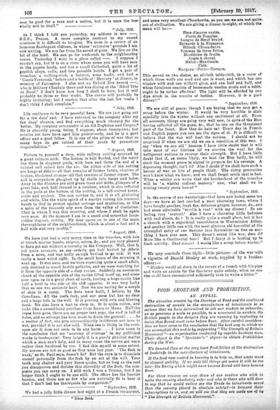"August, 1918.
We have just had a very merry time in the trenches, with lots of trench mortar bombs, snipers, mines, &c., and are very pleased to have got out without a casually in the Company. Well, that fs not quite accurate, as my orderly got half buried by debris from a mine, and was badly enough bruised to go sick. It was really a most weird sight. In the small hours of the morning it went up. It was ours, and we were expecting quite a small affair, only destined to wreck hostile galleries, and we were watching for it from the opposite side of a. deep ravine. Suddenly an. enormous chunk of the opposite side of the ravine lifted itself up, and came. over upon us in a great sheet of earth, leaving a huge cavity like half a bowl iu the side of the cliff opposite. It was very lucky that no one was seriously hurt. Now we are resting for a couple of days in a camp. The huts were built, I believe, by the Canadians. All the roofs leak, and our mess but has no door and a large hole in the wall. It is pouring with rain and blowing hard. We also have a tent to sleep in. It is quite rotten, and looks like a second-band purchase from Isaacs or Moses. Half the ropes have gone, there are no proper tent pegs, the roof is full of holes, and no attempt has been made to drain the ground ! . . . As a matter of fact, one gets extraordinarily indifferent out here to wet, provided it is not also cold. When one is living in the semi- open air it does not seem to do any harm. . . . I have come to the conclusion that my 'anatomy of courage' in my published, work is inadequate! Very largely it is a purely physical matter which a man can't help, and in many cases the-nerves get worn rather than hardened by use. I find this myself to some extent. My nerves are not as good as they were last year. The flesh is weak,' as St. Paul says, doesn't he? But the cure is to dissociate oneself personally from the flesh by an act of the will. Your teeth may chatter and your knees quake, but as long as the real you disapproves and derides this absurdity of the flesh, the com- posite you can carry on. I still wish I was a Tommy, but I no longer think I ought to be one still. The officer has the heavier burden, and there are so few who are naturally fit to bear it that I don't feel too inadequate by comparison."


































 Previous page
Previous page